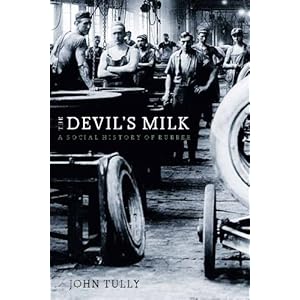Asia
Sri Lanka: The ‘colonisation war’ against Tamils

Within the box is one of the Tamil areas targeted by the Sri Lankan government for Sinhalese settlements. Map from Tamilnet.
By Chris Slee
March 14, 2011 – Links International Journal of Socialist Renewal – The Tamilnet website has accused the Sri Lankan government of waging a "colonisation war" against the Tamil people of the island of Sri Lanka. The government has been establishing Sinhalese settlements in traditional Tamil areas. The website compares this to Israel’s policy of establishing Jewish settlements in the West Bank, saying: "Sri Lanka is aiming at creating an Israeli model situation as fast as possible".[1]
`Coolie revolts': exclusive excerpt from 'The Devil's Milk: A social history of rubber'

The Devil’s Milk: A social history of rubber
By John Tully
Monthly Review Press, 2011
March 13, 2011 -- With the kind permission of Monthly Review Press, Links International Journal of Socialist Renewal is honoured to be able to bring its readers an exclusive excerpt from Australian socialist John Tully's fascinating new book, The Devil’s Milk: A social history of rubber. The section below details how the peoples of the colonies exploited by the imperialist rubber barons fought back against their oppression. Links readers are urged to purchase a copy of this excellent new book. See also an interview with John Tully about his new book, "New book reveals the history of rubber: holocausts, environmental destruction and class struggle".
Thailand: Why the lese majeste law is an abomination

By Giles Ji Ungpakorn
Philippines: Veteran revolutionary reflects on stormy times and prospects for the left

Full Quarter Storms
By Sonny Melencio
2010, Transform Asia Inc.
Thailand: Royalist right, ultra-nationalists want war with Cambodia
By Giles Ji Ungpakorn
Los lazos del gobierno srilanqués con Israel exponen su duplicidad

Donald Perera, embajador de Sri Lanka a Israel, en su oficina de Tel Aviv.
[English at http://links.org.au/node/1841.]
Por Chris Slee
Thailand, South Korea: Solidarity with Egypt's struggle for democracy
On February 1, 2011, about 100 members of Thailand's mass democracy (Red Shirts) and student movements gathered outside the Egyptian embassy in Bangkok to send solidarity and support to the people of Egypt fighting to rid their country of the dictatorial regime of Hosni Mubarak. The protest was organised and supported by the Student Federation of Thailand (SFT) and member organisations, Thai Youth for Democracy, 24 June Group and other democratic networks.
Egyptians and Koreans stand with one voice to denounce the Mubarak regime
By Roddy Quines, Seoul
Statements from the Socialist Party of Malaysia, Partido Lakas ng Masa (PLM, Party of the Labouring Masses) Philippines, Socialist Alliance (Australia), Labor Party Pakistan and Socialist Aotearoa.
* * *
Socialist Party of Malaysia solidarity statement with the People's Uprising in Egypt, Tunisia and the Middle East
Martin Hart-Landsberg: China and the jobs issue

"Approximately 90 per cent of China’s high technology exports to the US are produced by multinational corporations and many of them are being bought an
http://left21.com/article/9168
2011-01-22
저 명한 국제적 지식인들과 좌파단체·노동조합 등이 홍익대 미화 노동자 투쟁에 연대 메시지와 서명을 보내 왔다. 1월 22일 현재까지 미국의 저명한 경제학자 마틴 하트-랜즈버그, 세계적으로 저명한 마르크스주의자이자 영국 사회주의노동자당 중앙위원인 알렉스 캘리니코스를 포함해 지식인, 좌파·노동조합 주요 활동가 27명과 2개 단체가 동참했다. 아래 명단은 1차분이고, 이 서명은 앞으로도 계속 진행될 예정이다. 이 서명은 다함께 국제연락팀 박준규가 주도적으로 조직했다.
연대서명과 메시지(1월 22일 현재까지 1차분)
